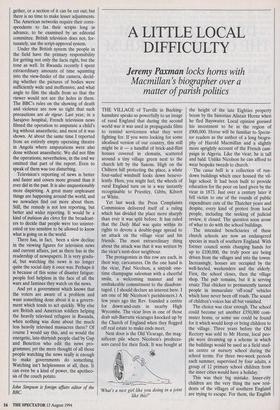DESPATCHES FROM THE GLASS AQUARIUM
John Simpson gives an insider's account of
how television news is made — why it ignores some wars and drenches us with others
ONCE UPON a time the British watched the news on television with the same sense of duty that made them stand in the cine- ma, embarrassed, while 'God Save the Queen' was played. We watched, not because it was particularly interesting, but because we felt we should. It appealed to our forelock-tugging instincts: people who knew more than we did were telling us what was going on. Or some of what was going on; a Private Eye parody of Radio Times once read, '9.00: Richard Baker with pictures of some of today's fires.'
Nowadays the BBC has four main news programmes a day, with a combined audi- ence of about 20 million. ITN's news pro- grammes have audiences which are often not much smaller. Altogether, allowing for those who watch more than one pro- gramme, more than 30 million people watch a television news bulletin each day; that is probably more than do any other single thing apart from performing the basic functions of living.
It is, I sometimes reflect as I sit at the morning editorial meeting at BBC Televi- sion Centre, rather daunting. The meeting is a small one: a dozen or so people, fewer than half of them women, crammed into a small glass office like goldfish being sold at a fairground. At 50, I am often the oldest per- son there. Many are disturbingly bright: the days of the woolly cardigan and the second- class Oxbridge English degree are-gone. We review the output of the previous 24 hours, critically but without the instinct for blood which marks other parts of the corporation, then move on to the list of news events expected for the day ahead: speeches, votes, visits, meetings. It is the unexpected that makes the news, of course, but editors like a framework for their day as much as they dis- like vagueness; I gave up saying things like 'Nigeria looks interesting' at these meetings some time ago.
What is it, though, that attracts the atten- tion of these late-thirtyish, broadsheet-read- ing characters, still on their first marriages and with children of nursery school age? How, from the thousands of possible events between nine in the morning and nine at night, will they select a dozen or so? The lead stories are often obvious enough: the economy, Ireland, the cabinet. But after that the judgments diverge, and the ques- tions arise. Why so much coverage of the refugees in Rwanda, when the aid agencies are warning that 3 million people may soon die of hunger in Angola? Why Africa, when so much is happening in the streets of Britain? Why don't we see more from Bosnia, the previous subject of intense news reporting? Why so little news from France and Germany? Why so much from Ameri- ca, when countries like Bangladesh, which provides us with many tens of thousands of viewers in Britain, go unnoticed? The BBC is now the largest news-gathering organisa- tion in the world; so why does it report from the same places, day after day? Television news is expensive. If your main aim is to provide an accurate overall picture of the day's events, you have to send your crews and correspondents to cover bankable certainties. That has tended to ensure that Washington, South Africa, the former Yugoslavia and the Middle East have had a regular place in the news. For the time being Rwanda seems to have joined the list, and rightly: a quarter of the population has been exterminated in a deliberate policy of genocide.
From time to time in the glass aquarium where the BBC's morning meeting is held there is a debate about the balance of for- eign and domestic reporting. Yet there are no rules, or even guidelines, for selecting the news: it is up to the individual men and women in charge of the bulletins to decide what to put in. And they are essentially on their own when they make their decisions. No central committee — it seems a pity to disillusion the conspiracy-minded about this — dictates to them.
Editing a television news bulletin is also something of an act of faith. The speed with which reports have to be assembled in the field means that the programme editor is unlikely to see the precise content and wording of the reports sent in from abroad until five or ten minutes before the news programme begins. Because we can send a report by satellite at the very last moment, we almost invariably do. If a report is bad, or wrong, or distasteful, it can be dropped alto- gether, or a section of it can be cut out; but there is no time to make lesser adjustments. The American networks require their corre- spondents to fax their scripts long in advance, to be examined by an editorial committee. British television does not, for- tunately, use the script-approval system.
Under the British system the people in the field have the primary responsibility for getting not only the facts right, but the tone as well. In Rwanda recently I spent extraordinary amounts of time squinting into the view-finder of the camera, decid- ing whether the pictures of bodies were sufficiently wide and inoffensive, and what angle to film the skulls from so that the viewer would not see the holes in them. The BBC's rules on the showing of death and violence are now so tight that such precautions are de rigeur. Last year, in a Sarajevo hospital, French television news filmed the operation to amputate a child's leg without anaesthetic, and most of it was shown. At about the same time I reported from an entirely empty operating theatre in Angola where amputations were also done without anaesthetic. We did not film the operations; nevertheless, in the end we omitted that part of the report. Even to speak of them was too disturbing.
Television's reporting of news is better and faster and covers more ground than it ever did in the past. It is also unquestionably more dispiriting. A great many unpleasant things are happening around the world, and we nowadays find out more about them. Still, the remedy is not less reporting, but better and wider reporting. It would be a kind of trahison des clercs for the broadcast- ers to decide that people were too uninter- ested or too sensitive to be allowed to know what is going on in the world.
There has, in fact, been a slow decline in the viewing figures for television news and current affairs, just as there has in the readership of newspapers. It is very gradu- al, but watching the news is no longer quite the social duty it once was. Perhaps it is because of this sense of disaster fatigue: people feel helpless in the face of all the wars and famines they watch on the news.
And yet a government which knows that the voters are aware of a problem and want something done about it is a govern- ment which tends to act quickly. Why else are British and American soldiers helping the heavily televised refugees in Rwanda, when nothing was done about the much less heavily televised massacres there? Of course I would say this, and so would the energetic, late-thirtyish people clad by Gap and Benetton who edit the news pro- grammes; yet the mere thought of all those people watching the news really is enough to make governments do something. Watching isn't helplessness at all, then. It can even be a kind of power, the apotheo- sis of the couch potato.
John Simpson is foreign affairs editor of the BBC.











































 Previous page
Previous page